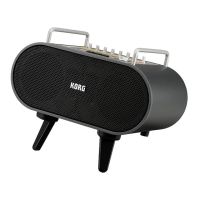Quick Start
19
Playing audio les and recording
your performance (Player mode)
In Player mode, you can play WAV format (44.1 kHz/16-bit,
stereo) audio les from the SD card.
You can also record your performance on the recorder along
with the audio le that is playing back.
Playing audio les stored on an SD card
Here’s how you can copy audio les from your computer to
an SD card and play back those les on the STAGEMAN 80.
1
5
6
6
7
2,5
3
2
4,8,9
Preparing audio les
1. Format an SD card on the STAGEMAN 80.
See page 10 “Formaing (initializing) an SD card”
2. Power-o the STAGEMAN 80, and remove the SD card.
3. Insert the SD card into your computer, and copy an
audio le from your computer into one of the [M1]–[M8]
locations in the PLAYER folder of the SD card.
See page 26 “Folder and le structure”
4. When you’ve nished copying the audio les, remove
the SD card from your computer and insert it into the
STAGEMAN 80.
5. Power-on the STAGEMAN 80.
Playing back
1. Take the steps described in “Preparing audio files” on
page 19.
2. Press the [PLAYER] buon to enter Player mode.
The [SD Card] buon lights.
The display shows the number of the audio les stored
on the SD card. The rst item of data on the SD card is
selected. The audio les in the PLAYER folder of the SD
card are shown by the STAGEMAN 80 in alphabetical
order of their le name.
3. Use the [M1]–[M8] buons to select the folder on the SD
card that contains the song you want to play.
The buon corresponding to the selected folder blinks.
See page 26 "Folder and file structure"
4. Press the [
] buon to play the le.
When the le has nished playing, the next le plays.
When all les in the SD card have played, playback stops.
Tip: This is because with the default seings, Loop/
Auto is on, and the operating mode is LP:C1. You can
change this mode (see page 24 “Loop/auto-consecutive
playback function”).
5. You can use the [F1] or [F2] buons to select an audio le
to play.
6. Use the RHYTHM/PLAY knob to adjust the playback
volume of the audio le, and use the VOLUME knob to
adjust the overall volume.
7. During playback, you can use the VALUE dial to change
the playback speed.
You can adjust the speed in the range of ±25%.
The display indicates the value for approximately one
second, and then returns to showing the playback
position.
8. During playback, you can press the [
] buon to
pause.
If you press the [VAR] buon, playback stops and you
return to the beginning.
9. Press the [
] buon once again to start playback
from the paused location.
Tip: In Player mode, you can use the playlist function to
play only the les you want in a specic order (see page 24
“Playlist function”).
Recording your own performance
together with the audio le playback
Just as you can record your performance together with a
rhythm style, you can record your performance together with
an audio le that’s playing.
1
1,3
3,4,6
3
3
2
2
2,3
3
The recorded data is saved on an SD card inserted in the
SD card slot. In order to record, insert the SD card into the
SD card slot before you turn on the power (see page 10
“Inserting or removing an SD card”).
1. Connect the mic or instrument that you want to record,
and adjust the volume accordingly.
See page 13 “Connecting and playing instruments”
2. Use the [M1]–[M8], [(1) 8 BEAT1]–[(24) SAMBA] buons
or the [F1] and [F2] buons to select an audio le.

